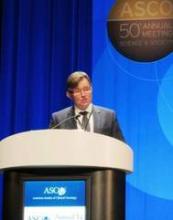CHICAGO – Lenalidomide in combination with R-CHOP chemotherapy induced responses in 98% of patients with newly diagnosed diffuse large B-cell lymphoma in a phase II study.
Among the 60 evaluable patients, 80% had complete responses, and 18% had partial responses.
Moreover, progression-free and overall survival were increased with lenalidomide (Revlimid) in the activated B-cell (ABC) or non–germinal center B-cell (non-GCB) subtype, which is associated with a poor outcome when treated with standard R-CHOP monotherapy.
"It appears the addition of lenalidomide to R-CHOP may ameliorate the negative effect of the non-GCB phenotype on outcome," Dr. Grzegorz Nowakowski said at the annual meeting of the American Society of Clinical Oncology.
About 40% of patients with diffuse large B-cell lymphoma (DLBCL) given R-CHOP every 21 days will relapse or develop refractory disease. For those who do, the response rate for single-agent lenalidomide is about 30%, he said.
The study involved 64 patients with untreated stages II-V CD20-positive DLBCL who received oral lenalidomide 25 mg on days 1-10 with standard-dose R-CHOP (cyclophosphamide, hydroxydaunorubicin, vincristine, and prednisone) chemotherapy every 21 days for six cycles (R2CHOP).
All patients received pegfilgrastim on day 2 of each cycle and aspirin prophylaxis throughout.
At baseline, 25% of patients were older than age 70 years, 60% had stage IV disease, and 52% were International Prognostic Index high intermediate or high risk.
The DLBCL subtype was germinal-center B-cell (GCB) in 51% and non-GCB in 34%, with 16% unknown.
Efficacy was examined by DLBCL subtype and against a matched case-control cohort of 87 consecutive, contemporary DLBCL cases in the Mayo Clinic Lymphoma Database who were treated with R-CHOP alone.
At 2 years, progression-free survival (PFS) and overall survival rates in the R2CHOP group were 59% and 78%, compared with rates of 52% and 65% in the R-CHOP case-matched controls, said Dr. Nowakowski of the Mayo Clinic, Rochester, Minn.
When the case controls were examined by molecular subtype, there was a significant difference between non-GCB and GCB controls treated with standard R-CHOP alone for progression-free survival (28% vs. 64%; P = .00029) and overall survival (46% vs. 74%; P = .000036).
In contrast, non-GCB and GCB treated with R2CHOP with lenalidomide had similar rates of progression (60% vs. 59%; P = 0.83) and overall survival at 2 years (83% vs. 75%; P = .61), he reported.
Similar results were recently seen in elderly DLBCL patients in the phase II Italian REAL07 trial (Lancet Oncol. 2014 Jun;15:730-7), said Dr. Nowakowski and invited discussant Dr. Andre Goy, chief of lymphoma and chair and director, John Theurer Cancer Center, Hackensack (N.J.) University Medical Center.
Lenalidomide offers "very promising activity with R2CHOP, particularly in the non-GC subtype," Dr. Goy said "These data will need to be confirmed in ongoing randomized studies, but might offer a new platform in combination/maintenance post–R-CHOP, particularly in elderly patients because the ABC percentage increases with age and they tend to have a worse outcome."
Dr. Goy observed that lenalidomide increased the incidence of grade 3 and 4 neutropenia and thrombocytopenia, but this did not translate into more infections, serious adverse events, or treatment delays.
Grade 3 febrile neutropenia developed in six patients, grade 4 sepsis in one, hemorrhage in one, and thrombosis in one, Dr. Nowakowski said. One patient died of perforation/sepsis unrelated to treatment.
The ongoing phase II ECOG 1412 trial is utilizing gene expression profiling of DLBCL subtype in its evaluation of the efficacy of R2CHOP vs. R-CHOP, he said.
The study was supported by Celgene. Dr. Nowakowski reported having no financial disclosures. Dr. Goy reported serving in a consultant or advisory role with Celgene and Pharmacyclics and receiving honoraria from Janssen Oncology and Millennium Pharmaceuticals.


